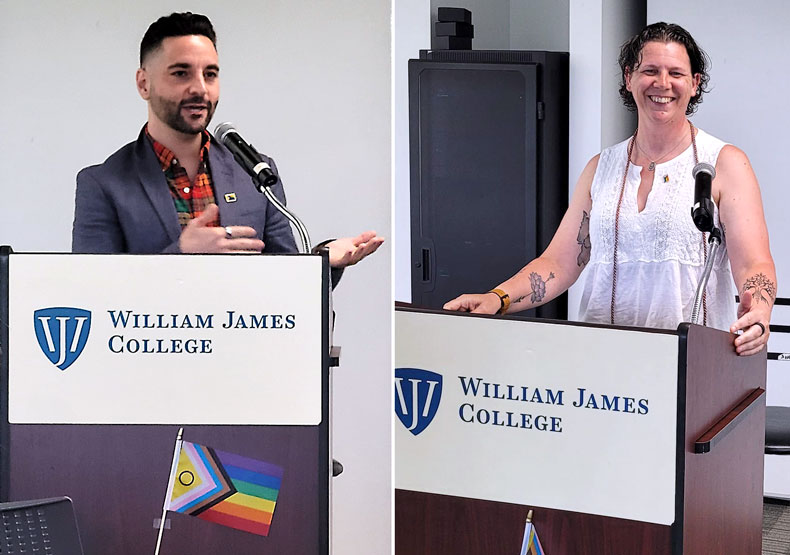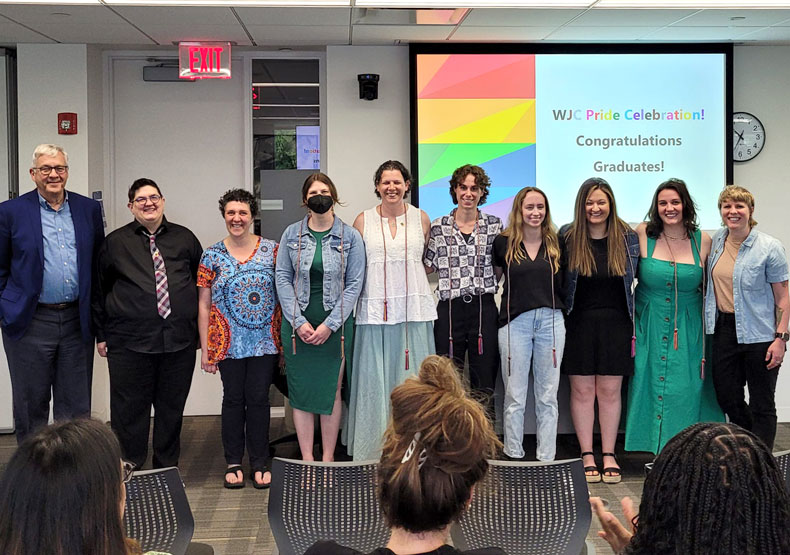A Pair of WJC Alums Take Pride in Working with the LGBTQIA+ Population

Karam Hanna (left) and Ann Bruck (right)
On the eve of Pride Month, six students from the William James College class of 2024 received rainbow-colored cords to honor their completion of the LGBTQIA+ Studies Concentration. The timing of the May 29 celebration was no accident: In 1999, on the 30th anniversary of the Stonewall Riots, the federal government first recognized Gay & Lesbian Pride Month; since then, the Pride moniker—like the flag—has evolved to include more and more marginalized groups. The new tradition of rainbow cord distribution, conceived of to recognize what has become a burgeoning area of study on campus, was more than apropos: Since last June, when Colleen Deely became the first student to graduate with a concentration in LGBTQIA+ Studies, the cohort has grown exponentially to include one PsyD in Clinical Psychology and five MA in Clinical Mental Health Counseling graduates—a figure that’s poised to double come fall.
“Seeing the increased need for services among marginalized communities, including those who identify as LGBT, [spurred me] to seek more in-depth education about how to support these folks,” says Ann Bruck, 2024 graduate of the Master of Arts in Clinical Mental Health Counseling, a career change student with more than two decades of experience working in the world of personal training and yoga. After earning their Master of Science in gerontology from UMass Boston in 2020, Bruck could see the detrimental effects of COVID-era isolation among the aging folks with whom they were working.
“I started to see a significant need for mental health services [among my clients],” says Bruck, citing the potential to integrate physical wellness with mental wellness as initially attracting them to the program. An emphasis on field education (for example, requiring 360 hours in an academic year instead of 100 in one semester - the practicum requirement for licensure, in addition to the 600 hours of internship), was equally enticing. An initial placement at The Dimock Center, a community health center in Roxbury, found Bruck working in the detox unit—comfortable subject matter for them to approach given a family history of substance use. Additional lived experience has proven equally valuable in the field.
“I've been out for 20 years, and the need for services among marginalized communities—from individuals who are unhoused and facing substance use to LGBT folks—has only increased” says Bruck who identifies as part of the LGBTQIA+ community. Keen on supporting this population in particular, they switched from the general track to the LGBTQIA+ Studies Concentration following their initial semester and never looked back.
“I’m a hands-on person who learns by doing,” says Bruck whose second field placement, at the Worcester-based Seven Hills Behavioral Health, was instrumental in providing the skills needed to continue working with the LGBTQIA+ population. “The big draw for me was their Gender Wellness Initiative, a group dedicated to creating programming to assist the community in increasing competency around the needs of LGBTQIA+ youth”, says Bruck, pointing to a gender affirming care supervision group they attended weekly. This forum, rife with learning opportunities about advocating for folks seeking everything from hormone replacement therapy to surgery, was co-led by Karam Hanna, LMFT, who earned his Master of Arts in Clinical Mental Health Counseling from William James College in 2018.
“The [campus] environment is supportive of everyone’s identity, [including] sexual orientation, and the staff are very forthcoming with their own [lived experience surrounding] sexual orientation and gender identity,” says Hanna of a space in which he was immediately comfortable being himself. He recalls not only appreciating but also feeling more connected to professors who were genuinely being themselves—approaches that have undoubtedly influenced his own work as an outpatient therapist in family and couples counseling.
“I’m within the LGBT umbrella, so to me [working with this population] was not scary, it seemed natural” says Hanna whose interest in and advocacy for gender affirming care spans his six-year tenure at Seven Hills. A passion for working with couples and families in the LGBT community led to a stark realization: Amidst a growing need for gender affirming care, many clinicians are afraid to work with the population for fear of making mistakes and—even worse—offending clients. In 2018, just two colleagues at the agency were working with the population.
“Back then, it was all new,” says Hanna recalling the novel concept of pronouns and the need to respect them. Fast forward six years and Hanna spends 50% of his time helping clients do the work of processing gender identity and writing letters in support of their gender expression—which, according to new World Professional Association for Transgender Health (WPATH) standards, can happen after six months of therapy as opposed to one year.
As to the approach that’s best served Hanna in working with clients from all walks of life, in particular teens who have been ostracized by their peers and shunned in social settings? “Be your genuine self” he says, underscoring an approach gleaned from on-the-ground experience.
“As much as one can learn in the classroom, working in the field is where the skills, knowledge and information really converge,” says Bruck who recently accepted a job (securing a job before graduation!) with Bridge Over Troubled Waters. In early July, they will begin work as a behavioral health therapist at the Boston-based nonprofit that brings five decades of experience to their work with transitional age youth—most of whom have some form of substance use disorder, a large percentage of whom are unhoused, and about 20% of whom identify as belonging to the LGBT community.
“The high rates of substance use disorder in the LGBT community is not something that’s talked about,” says Bruck who has their sights set on dismantling the binary system within substance use treatment centers which, at present, requires those individuals who identify as transgender or gender non conforming to pick between a male wing and a female wing. This very acumen for advocacy is what likely earned Bruck, a student co-leader for the Rainbow Alliance, a surprise shout out from Rochelle Walensky, MD, MPH—former Director, Centers for Disease Control and Prevention—during her June 9 commencement address.
“I grew up in a family unit where service to others was really important,” says Bruck, pointing to her dad’s time spent in the Navy and her mother’s work as a nurse. “[My chosen work] is just one way I can continue working with populations that are near and dear to my heart and affect me in more ways than one.”
As to Hanna’s why? “Simply put, because I care,” he says in a nod to why he became a therapist in the first place. “I have clients who tell me the 45 minutes a week they get with me is the only time they can fully be themselves in a safe space—which, in my opinion, is the best thing I can do for someone,” he says.
Since its inception in Spring 2022, the LGBTQIA+ Studies Concentration—which provides mental health professionals with the language, cultural sensitivity, and clinical competence that will enable them to deliver high-quality care to LGBTQIA+ populations—has been a differentiator for the College; the concentration requires three, 3-credit classes (taught synchronously via Zoom and available to all graduate students as an elective).
“It’s been amazing to see how quickly the concentration and courses have grown,” Jessica Stahl, PhD, Director of the LGBTQIA+ Studies Concentration told graduates at the campus Pride Celebration citing an increase of almost triple the enrollment in classes—and more than eight times the enrollment in the concentration—in just three years.
“At William James College, we were encouraged to be social justice warriors—to get out there and advocate for others—which really resonated with me and sparked the work,” says Hanna who, after being invited by the administration to join the Rainbow Alliance (where Bruck was a student co-leader during their tenure on campus), served as a marshall in the Boston Pride For the People Parade—leading groups of 33 and 55 folks from William James College in 2017 and 2018 respectively. When it comes to recruiting others to work with the LGBT population, Hanna has one kernel of invaluable advice.
“It’s not a disorder, it’s an identity that [we] should [all] be familiar with,” he explains, underscoring that most LGBT folks suffer from anxiety and depression due to lingering societal stigma. For those practitioners hesitant to work with this population for fear of making mistakes, Hanna has more words of encouragement.
“When I first started doing the work, I slipped a thousand times—misgendering people and using the wrong pronouns. But I learned to say I’m sorry, correct myself, and move past it, because that’s how I learned—by making mistakes. But first I made an effort.”

- Tags:
- In the Community
Topics/Tags
Follow William James College
Media Contact
- Katie O'Hare
- Senior Director of Marketing
- katie_ohare@williamjames.edu
- 617-564-9389
